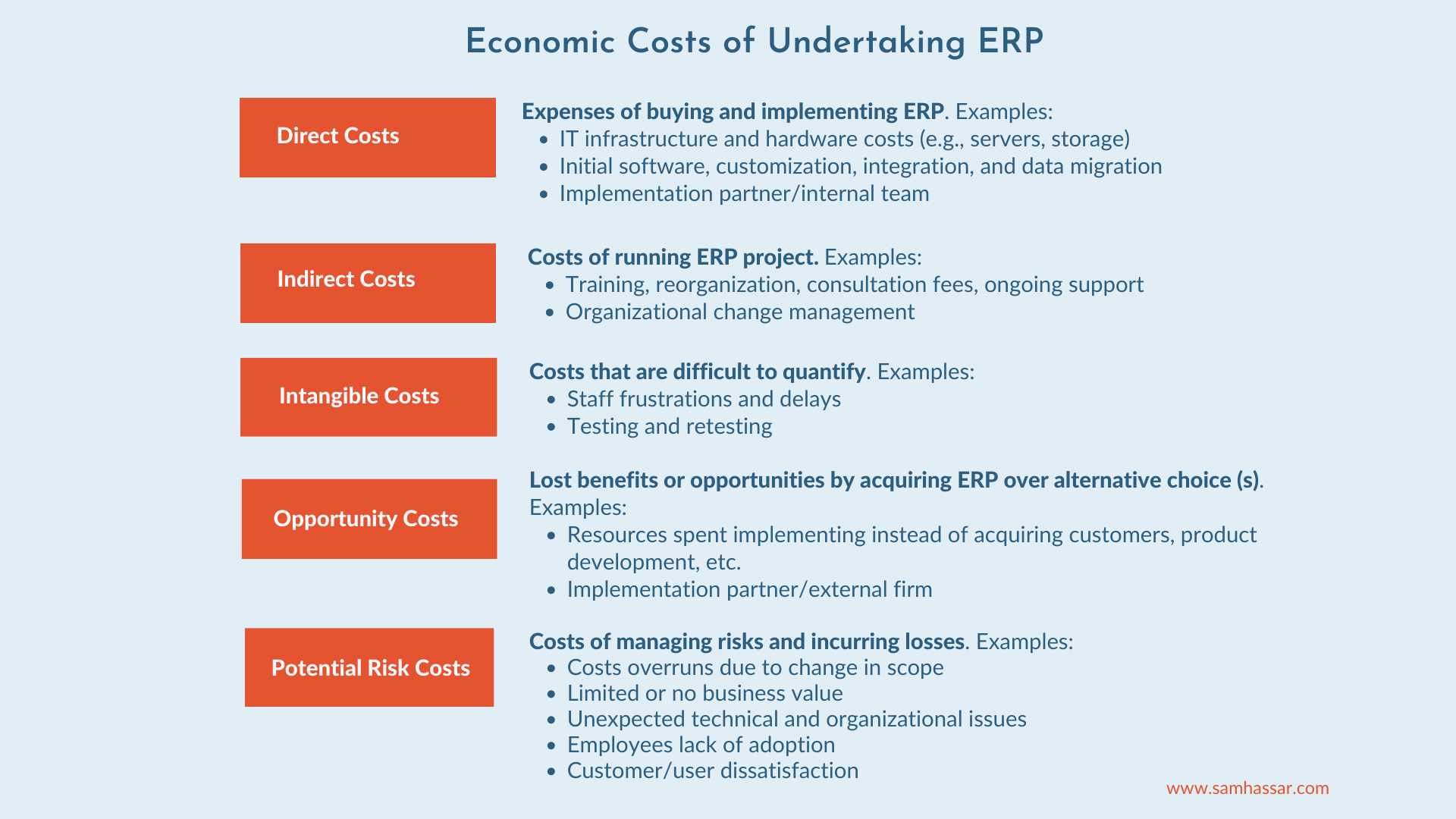ERP for Startups: Value Added or Disaster in the Making?
In a recent meeting with a startup CEO, I was surprised and maybe a bit shocked to hear him mention ERP was on their list. I understand company’s need for a comprehensive system, but given the high cost and failure rates of ERP, especially for a startup, is it worth it?
The topic is valuable and certainly with high stakes, but when I started delving deeper, I discovered very little about ERPs and startups exist, especially from non-vendors.
Interestingly I found that Oracle's business to startups is growing about 400% year-over-year, and similarly, SAP has added 773 Startups as its users.
So, I started looking into startups and ERP more.
This blog post is part of a series sharing my findings.
What pushes startup or scaleup to consider ERP systems?
ERP (enterprise resource planning) is a software application that integrates multiple business functions into an integrated environment and within a central database with shared data across different business units and users.
As a startup in the growing or scaling stage, you might find yourself quickly with large teams that may require more management, and a sophisticated accounting system, and a lot more.
ERP systems could integrate accounting, human resources, manufacturing, distribution, customer relationship management, project management, inventory management and control, quality assurance, and others into one seamless system providing up-to-date analytics.
Startups in certain industries like manufacturing often need to operate a more extensive and complex business that may explain why increasingly ERP providers are targeting startups. For example, as we end 2021 and enter 2022, we, consumers and businesses, are experiencing the broad impact of supply chain disruptions and risks associated with it. As a result, many companies invest in systems, such as ERP software to bring transparency to the process and ultimately make decisions on the fly without compromising confidence. Below are three typical reasons startups and scaleups adopt ERP.
1. Improve access to analytics by having current and consistent data.
Having multiple systems and software (e.g., accounting, customer relationship management, Project Management, emails) can be cumbersome, with many inconsistencies. These disjointed systems, especially in fast-growing companies, can lead to inefficient operations and decision-making, pushing companies to consider ERP solutions.
With the availability of Cloud ERP, there is more flexibility to customize ERP software and better cost management. These two elements are significant hurdles in the past that made ERP out of reach for non-established and small companies.
2. Streamline operations with industry-specific needs.
Companies specialized industries like manufacturing often have specific business needs and operational processes. For example, using multiple software for material requirements and planning, production schedules and processes, order management, and accounting can be costly and inefficient.
Large companies like Walmart and FedEx are already investing and innovating in this area by adopting Blockchain technology. Investing in ERP is costly enough, and blockchain is even more expensive. It is also unclear if the cost and inefficiencies are worth it. But this technology is improving fast, and this will change.
However, startups and scaleups don't have the luxury to wither the high costs and risks unless the benefit significantly outweighs the risks.
3. Improve coordination for global expansion
Companies seeking to expand globally, which is critical for startups to scale, need a high level of automation to align business functions, currency conversions, and improve visibility and reporting of finances and other processes. With different time zones, languages, currencies, and human resources, markets, the need for timely and accurate reporting and analytics to make better decisions and catch miscues becomes even more critical.
While there are a few successful examples of big companies, it wasn't easy to find case studies of startups and scaleups sharing their process and challenges, especially from non-ERP vendors.
Let’s get to the costs of ERP.
What are the economic costs of ERP you need to consider?
With more than 70% of ERP implementations failing, the risks for startups means threats to their existence. According to McKinsey, 75% of ERP implementation fail to meet the budget or schedule, and 66% have a negative return on investment. Panorama Consulting reported that 62% of their respondents in 2020 went over their budgets by an average of 66%.
If you are a startup or small-medium business considering ERP, you need to seriously consider various options' economic costs and benefits.
This means considering the costs of undertaking ERP beyond the immediate expenses incurred from the purchase. Consider all potential costs - Direct Costs, Indirect Costs, Intangible Costs, Opportunity Costs, and Potential Risks Cots (see figure below)
In addition to the costs, are you getting ERP to solve the correct problems? Here are questions to help you with making the right decision for you.
Answer these 4 questions to prevent an ERP disaster
Before undertaking a considerable commitment to adopt an ERP system, businesses, especially startups, should answer these 4 questions honestly.
1. What are your startup's business goals?
The clearer you are about your (and your team's) business goals and your practical vision for your startup, the better decision you'll make whether or not to take on ERP and which to select. Later upgrades can be costly as well. This is a fundamental question, and if a startup can't answer, its ERP journey will be rockier.
Being clear where you are heading influences which company you go with and which features are most important for the business growth—for example, a cloud ERP, SaaS ERP solution, or hybrid. Features like artificial intelligence capability to automate documentation or multiple languages for international expansion are many features from which to choose. Multiple choices complicate decisions, especially with unclear goals and measures of success. Establishing benchmarks and metrics to monitor progress are often missing but are fundamental to successful ERP implementation.
2. What obstacles coming in the way of achieving that? And which of those does ERP Solve?
After answering the first question, knowing what obstacles prevent you from achieving these business goals and overall vision. Because if an ERP system does not help you alleviate blocks, what is the point.
Here, think of what bottlenecks you have, what aspects of the business are lagging, and all the areas impacted by the lags.
One of the reasons for going over budget is scope creep. Having a clear idea of your mountain top and the obstacles getting in your way provide you with evidence of what you need from an ERP system and ERP integration.
So let the evidence be your guide.
3. What new obstacles does ERP create?
Regardless of how good it is, a new system contributes to enormous change as a part of the course. However, a new system may create new obstacles to an area or more of the business, especially if there are mismatches between the old system and ERP software. Often, customizing ERP components increases costs and risks.
Inadequate understanding of the impact might lead to paying dearly later. For example, in the case of Lidl, a German supermarket, the company abandoned the implementation midway and after €500 million because how they track their inventory did not match the ERP system requiring expensive customization.
As a result, Lidl spent €500 million in addition to other tangible and intangible costs.
If the obstacles ERP creates are more significant than it resolves, delaying the decision is wise.
4. Who will be impacted by implementing an ERP system?
In the end, ERP is all about PEOPLE; it’s a people project, not only a technology project. A critical question that is often ignored or inadequately addressed.
Companies that treat ERP as a technology project, cutting corners on the people side- for example, 95% of the companies where ERP failed dedicated less than 10% of the total budget to training. More than 65% of companies find organizational change as difficult or very difficult.
People manage projects, configure the system, implement ERP, and decide to use it or not.
Truly understanding what your people need from executives to front lines and how it will help them do their job requires their input early. With an ERP system, there is no one-size-fits-all. Integrating change management early on would mitigate the pain points of implementing ERP and help you achieve the intended business benefits.
Conclusion
Deciding to adopt ERP for your startup or scaleup is not easy and comes with high risks. If you are considering ERP, first be clear about the business goals, your alternative solutions, benefits, and their associated risks and costs in the short and long term.
Regardless of what you choose, make the people's side of change a priority because it is a big reason ERP projects often fail.
The next blog posts in this series will be sharing experiences and learning by startups who went through the process. Stay tuned for more!
Are you a startup or scaleup founder/CEO who implemented ERP (or considered it)? I want to know more about your experience.

